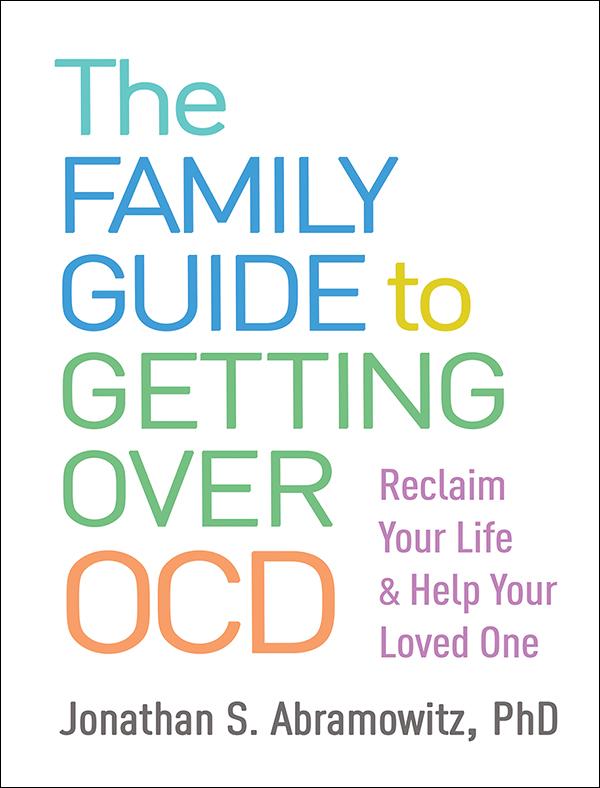
Credit: The Guilford Press
New York, NY–When a loved one has Obsessive-Compulsive Disorder (OCD), it’s a constant struggle. It hurts to see your spouse so anxious or your teen spending so much time alone. This is especially true right now, as the COVID-19 panic has exacerbated OCD symptoms for many people who struggle with the disorder.
Psychologist Jonathan Abramowitz is an internationally recognized expert on OCD and anxiety disorders. Over the course of his 25-year career, he has come to believe that OCD isn’t an individual issue; it is a family issue.
The key to successfully helping your loved one? First you must focus on your own behavior and learn to reduce patterns of “family accommodation,” such as helping with rituals, tolerating avoidance of triggers, or looking the other way as the person with OCD performs obsessive-compulsive rituals.
“I’ve worked with countless families affected by OCD. And I’m here to tell you that it doesn’t have to be this way. You can turn things around. You don’t have to walk on eggshells. You don’t have to argue…The solution is to provide the kind of consistent support that helps your relative develop the confidence and skills to manage OCD in a healthier way and without needing to lean so much on you or others,” Dr. Abramowitz writes in his new book, The Family Guide to Getting Over OCD.
Use the ‘SMART method’ to reduce family accommodation and help your loved one with OCD
Dr. Abramowitz recommends using the acronym SMART to help you optimize your goals and maximize your likelihood of success. Here’s how it works:
S is for SPECIFIC — Make your goals as detailed and specific as possible. Simply saying “My goal is to stop accommodating” is too hazy. Instead, use “I will no longer help Ariel check the doors and appliances before bed.” Try to choose goals that rest solely on your own actions (for example, “I will leave the house regardless of whether Brandon is ready to go” vs. “Brandon will stop preforming rituals that make us late.”) You’ve got a better chance of meeting goals when they’re fully under your control. Keep the focus on changing your own behavior.
M is for MEASURABLE — Your goals for reducing accommodation also need to be measurable so that you know when you have succeeded. Choose concrete goals that you can keep track of. “Stop throwing away items Antonio has deemed ‘contaminated'” provides a specific target to be measured: whether or not you’ve thrown anything away. On the other hand, “Do a better job of not accommodating Antonio’s OCD” is not measurable: How will you decide if you’ve done a better job? Setting goals to change observable behaviors (that someone else would be able to see) is your best bet for making sure your goals are measurable.
A is for ACHIEVABLE — Your goals should challenge you to stay focused and committed
to your program, but at the same time they need to be realistic. If you set goals that stretch you (and your loved one with OCD), you will continue to put in the effort to achieve them. On the other hand, you probably won’t stay committed to goals that are too far out of reach. For example, “I will never reassure my sister again” is probably unattainable, especially if you’ve become accustomed to providing reassurance and your sister is clever about getting it from you. Instead, “I will stop answering my sister’s texts when she asks for reassurance” is probably a more reasonable (and also a more specific) goal.
R = RELEVANT — Without an emotional tie to your goals, you’ll lose the motivation to stick with them. In this case, they should obviously relate to (1) helping your loved one develop self-confidence and the ability to manage anxiety on her own, (2) reducing your involvement in her OCD symptoms, and (3) improving your and your family’s quality of life. Tying goals to one or more of these things will build your commitment to success.
T is for TIME BOUND — Finally, your goals should have a time frame. This means stipulating when you’ll begin changing your behavior–for example, “beginning tomorrow.” By specifying a time frame, you make your goal a priority, which increases motivation. Goals without specific time frames are less likely to be met because you feel you can put them off.
Overcoming family accommodation of OCD is not easy. “But remember,” says Dr. Abramowitz, “by gently but firmly encouraging the person you care about to face their fears, you can stop being controlled by their OCD. Ultimately your relationship will grow stronger, and your whole family will grow more confident and hopeful.”
###
Media Contact
Lucy Baker
[email protected]
Original Source
http://www.




